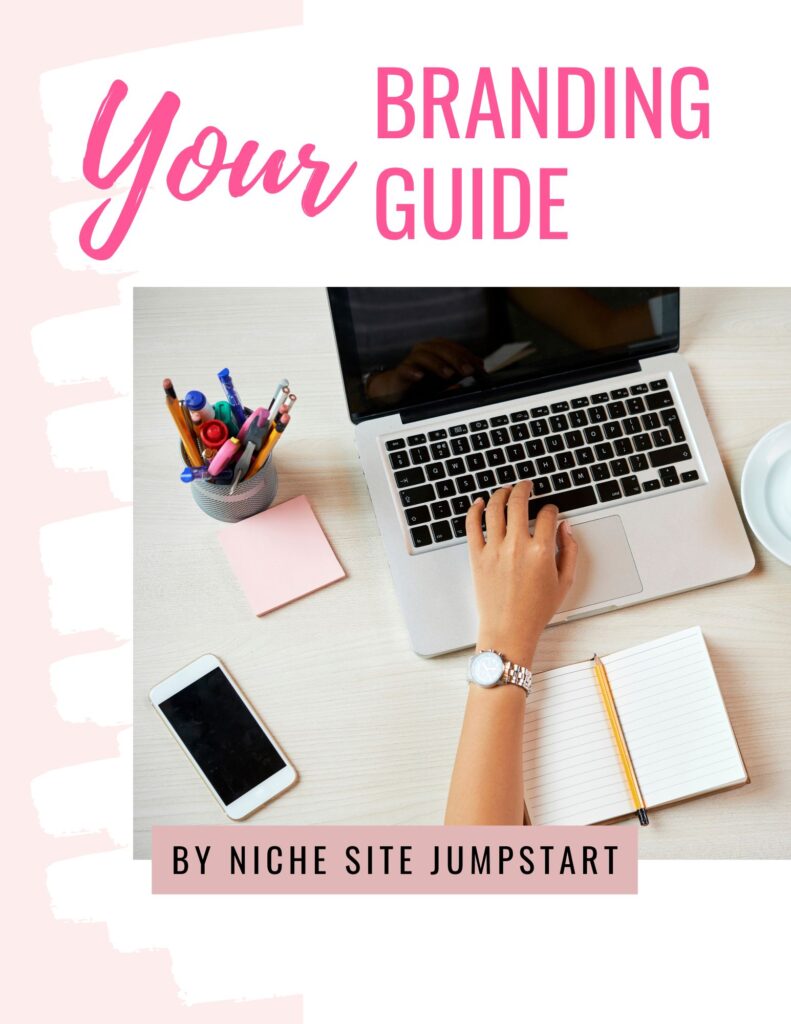Strategies for Selling Your Website To Maximize Profit
There are some affiliate links below, but they are all products I highly recommend. For more info, view my disclosure here.
So, you’ve put in all the effort to create an amazing blog. You’ve spent countless hours writing top-notch content, building a loyal audience, and establishing yourself as an expert in your niche.
Now, you’re ready to cash in on all your hard work by selling your blog for a tidy profit. But where do you even start? Don’t worry – we’ve got you covered with this complete guide on how to sell a blog for profit.
In this article, we’ll walk you through every step of the process – from determining your site’s value and finding potential buyers to negotiating a deal and transferring ownership.
By the time you’re finished reading, you’ll have all the tools and knowledge necessary to turn that digital property into cold, hard cash. So let’s dive right in and get started on turning your passion project into a profitable payday!

Sign up for exclusive access to our resource library, including this branding guide!

Assessing The Value Of Your Blog
Before diving into the process of selling your blog, it’s essential to determine its worth. Assessing the value of your blog is a crucial step, as it will help you set a reasonable price and attract potential buyers.
There are several factors to consider when evaluating your blog’s worth, such as traffic, revenue, growth potential, and overall niche appeal. Keep in mind that there isn’t a one-size-fits-all formula for valuing a blog, but understanding these key factors can give you a good starting point.
Traffic is one of the most critical aspects to consider when determining your blog’s value. Potential buyers are interested in blogs that have a steady stream of visitors because it indicates that the site is popular and engaging.
To get an idea of your blog’s traffic, examine metrics like unique visitors per month, average page views per visitor, and average time spent on the site by users. These statistics can be easily accessed through tools like Google Analytics.
While other analytics tools can provide stats, Google Analytics is the one accepted by most ad placement agencies like Mediavine. Using something else can affect the monetization options down the road, so for now it’s best to stick to GA.
Another important factor in assessing your blog’s value is its current revenue streams. Buyers want to know that they’re investing in a profitable venture and will likely look at how much money the blog generates through advertising, affiliate marketing programs, sponsored content deals, or product sales.
Be prepared to share detailed records of your income sources and expenses with potential buyers as this transparency can help build trust and show them that they’re making a sound investment.
Taking into account your blog’s growth potential is also necessary when determining its worth. While past performance plays an essential role in valuation, future prospects should not be overlooked – especially if you’ve recently implemented new strategies or uncovered untapped opportunities within your niche market. By demonstrating how these initiatives could lead to increased profits down the line, you’ll make your offering more attractive to prospective buyers.
Analyzing the competition within your niche and identifying any barriers to entry will further solidify the value proposition for potential investors by showcasing what sets your blog apart from others in the market.

Preparing Your Blog For Sale
It’s an emotional rollercoaster, isn’t it? The thought of parting with your beloved blog, the one you’ve poured your heart and soul into for years. But if you’re ready to let it go, whether you’re switching from blogging entirely or are just ready for a change of pace and niche. then it’s time to prep it for sale.
First things first: make sure your blog is in tip-top shape. This means going through every page with a fine-tooth comb, looking for broken links, outdated content, or any other issues that could turn off potential buyers. This broken link check site is free and a great way to make sure all links are up-to-date.
It’s also essential to ensure that all images are high-quality and fully optimized for web use. Remember, presentation is key when trying to sell a blog – so don’t skimp on the details!
Next up: gather all relevant data about your blog. Buyers will want to know everything from traffic statistics and audience demographics to financial records (including ad revenue and expenses).
Be prepared to provide detailed analytics reports from Google Analytics, as well as any other tools you may use to track performance.
If you have an email list or social media following associated with your blog, be sure to highlight these numbers as well – they can add significant value in the eyes of potential buyers.
It’s time now for some strategic thinking. Consider what makes your blog unique and valuable – is it the niche you serve? The quality of content? Your loyal audience? By identifying these selling points, you’ll be better equipped to market your blog effectively and attract serious buyers who understand its true worth.
And remember: while it might be hard to say goodbye, think of this as a new beginning rather than an ending – both for yourself and your cherished website!
Identifying Potential Buyers
Picture this: you’ve spent countless hours pouring your heart and soul into creating a fantastic blog, and now it’s time to find the perfect buyer who will appreciate its true value. In the vast ocean of potential buyers, finding the right one for your blog might seem like searching for a needle in a haystack.
To begin with, consider your niche or industry – this is where you’ll likely find your target audience. Start by researching similar blogs, websites, or even social media groups relevant to your niche. These platforms often have people who are already interested in similar content and may be potential buyers for your blog.
Keep an eye out for individuals who frequently engage with those communities, as they might be more inclined to invest in a blog that aligns with their interests. Next, tap into your existing network of contacts within the industry or niche. Fellow bloggers, influencers, or even previous collaborators might be interested in acquiring your blog as an extension of their brand or platform.
Be sure to reach out personally and let them know about this exciting opportunity – after all, nobody knows how valuable your blog is better than those who have witnessed its growth firsthand. As you navigate these waters of possibilities, don’t forget the importance of presenting your blog professionally and showcasing its worth effectively.
A well-crafted sales pitch highlighting key achievements and future potential will go a long way in attracting serious buyers who can envision themselves taking over the reins. And remember: patience is key – finding the ideal buyer may take some time but trust that it will be worth it when you see how much they appreciate what you’ve created.
If you don’t have a big network to market to, try marketplaces like Flippa, Motion Invest, or Empire Flippers. There are also countless Facebook groups solely for flipping sites. Be careful with these, however, as they can be filled with scammers. If you decide to go this route, make sure you use a service like Escrow.com to ensure the transfer process is undertaken as safely as possible.
Are you part of our Facebook group – Niche Site Jumpstart? Join us for lots of tips on buying, growing, and selling websites!
Negotiating A Fair Price
Having determined the target audience and identified potential buyers, it’s time to dive into the art of negotiation. Establishing a fair price for your blog is crucial for both you and the buyer. By approaching this phase with confidence and strategy, you can ensure that you receive appropriate compensation for your hard work while satisfying the buyer’s expectations.
To begin, conduct thorough research on comparable blogs in your niche to gauge the current market value. Consider factors such as traffic, revenue, content quality, domain authority and social media presence when comparing other blogs to yours. This will provide you with a solid foundation on which to base your asking price.
Remember that pricing too high may deter potential buyers, while undervaluing your blog could result in a significant financial loss.
When negotiating, maintain an open line of communication with prospective buyers to discuss their valuation of the blog and any concerns they may have. Be prepared to justify your asking price by presenting detailed information about its performance metrics, growth potential and unique selling points. Demonstrating a deep understanding of your blog’s worth will not only boost credibility but also give you leverage during negotiations.
A successful negotiation often requires flexibility from both parties involved; therefore, be prepared to make some concessions if necessary. For instance, consider offering additional support or training to ease the buyer’s transition into managing the blog or agree on a payment plan that suits their financial situation.
By ensuring that both parties feel satisfied with the outcome, you can foster a positive relationship with your blog’s new owner while securing maximum profit for yourself.
Is It Easy To Flip Websites? Find Out Here!

Website Flipping Mastery Course: Your Guide to Profitable Website Flipping
Ensuring A Smooth Transition
So, you’ve successfully attracted a buyer for your blog – congratulations! But don’t pop the champagne just yet; there’s still work to be done in ensuring a smooth transition. This essential step will not only guarantee that the new owner can seamlessly take over, but it will also leave a lasting positive impression and protect your reputation in the online world.
In this section, we’ll dive into the crucial aspects of making this changeover as effortless as possible.
Firstly, communication is key. Make sure to maintain an open line of dialogue with the buyer throughout the entire process. Address any questions or concerns they may have about taking over the blog and provide them with all necessary information regarding its operation.
This includes login details, passwords, and access to any tools or platforms used to manage content, analytics, or paid options. By being responsive and helpful during this period, you’ll build trust with the new owner and ease their concerns about managing their latest acquisition.
Read Next: A Comprehensive Guide to Transferring a Website After a Successful Sale!
Next up: documentation. Just like selling a car or a house, it’s important to have all relevant paperwork in order when transferring ownership of your blog. This should include contracts outlining terms of sale, non-disclosure agreements if applicable, and any other legal documents required by your jurisdiction.
Consider creating a comprehensive handbook for the new owner detailing day-to-day operations such as content management procedures and strategies for driving traffic growth. Providing this resource can save them valuable time in getting up to speed and ensure they’re well-equipped to maintain (or even improve) your site’s success.
Lastly, think about offering ongoing support during the initial handover period. While some buyers may prefer complete independence right from day one, others may appreciate having you available for guidance or advice as they settle into their new role running the blog.
Establish clear boundaries on what level of assistance you’re willing to provide – perhaps via email consultations or scheduled Zoom calls – but remember that going above and beyond during this stage can leave a lasting positive impression on the buyer and foster goodwill for any future dealings.
Your goal is to create a win-win situation where both parties feel satisfied and supported throughout the entire sale process.
Closing The Deal
After evaluating potential buyers and negotiating terms, it is time to close the deal. It’s essential to ensure that both parties are satisfied with the agreement before proceeding. One way to achieve this is by drafting a well-structured sales contract outlining all aspects of the transaction.
This document should include details such as the purchase price, payment terms, and any other relevant information. Having a legally binding contract in place will protect both the buyer and seller from potential disputes or misunderstandings down the line.
A crucial aspect of closing the deal is transferring ownership of your blog to the buyer. This process generally involves handing over all administrative rights, login credentials, domain registration, and hosting accounts associated with your blog.
Take necessary precautions when sharing sensitive information like passwords; consider using a secure method such as an encrypted file or password manager. Make sure you provide thorough instructions on how to manage and maintain your blog moving forward so that the transition is smooth for both parties.
Before finalizing the sale, it’s wise to have an exit plan in place for yourself. Determine what you’ll do with your newfound free time and financial gain from selling your blog – whether it’s starting a new business venture or investing in other opportunities. Having a solid plan can help alleviate any feelings of uncertainty or regret after parting ways with your blog.
Consider offering ongoing support or consulting services to your blog’s new owner as part of your exit strategy; this not only adds value but also allows you to maintain some involvement in its future success.
As you complete negotiations and approach closing day, remember that communication remains key throughout this process. Maintain regular contact with your buyer to address any questions or concerns they may have during their transition into ownership of your blog. By being proactive in addressing issues and providing support where needed, you can ensure a positive experience for everyone involved – including yourself – as you embark on new endeavors beyond your blog.
Tips For Maximizing Your Profit
Imagine yourself sitting comfortably in your favorite coffee shop, enjoying the aroma of freshly brewed coffee, while negotiating a profitable deal for the sale of your blog. You’ve put in the hard work and dedication to build it up, and now it’s time to reap the rewards.
To ensure you get top dollar for your website, let’s discuss some tips for maximizing your profit when selling your blog.
First and foremost, focus on increasing your blog’s revenue streams. Diversifying your income sources can make your blog more attractive to potential buyers.
This may include incorporating affiliate marketing programs, sponsored content opportunities, or even creating and selling digital products related to your niche. A steady increase in revenue over time will not only boost the value of your blog but also demonstrate its growth potential to prospective buyers.
Another crucial aspect is enhancing the overall user experience on your blog. By improving site navigation, optimizing page loading speeds, and ensuring mobile responsiveness, you provide an enjoyable browsing experience that keeps users coming back for more.
Invest time in sprucing up the visual appeal of your website with professional-looking graphics and an aesthetically pleasing layout. These improvements can significantly impact how much a buyer is willing to pay for your blog.
Last but not least, consider enlisting professional help to facilitate a smooth transaction process.
Working with a reputable broker or marketplace platform can expand the pool of potential buyers interested in purchasing your blog while also providing valuable guidance throughout negotiations and legal procedures involved in such transactions.
While these services may come with fees or commissions attached, they can prove invaluable in helping you achieve an optimal sale price for your blog and ensuring a seamless transfer of ownership.
Selling a blog for profit can be a rewarding and fulfilling experience if you follow the steps laid out in this guide.
By assessing your blog’s value, preparing it for sale, identifying potential buyers, negotiating a fair price, ensuring a smooth transition, and closing the deal, you’ll be well on your way to maximizing your profit.
Don’t forget to use the tips provided to further enhance your chances of success.
Remember that patience, persistence, and attention to detail will ultimately pay off in achieving the best possible outcome for both you and the buyer.

Hi There! I’m Natasha.
I’m a digital marketing expert based in the scenic mountains of Colorado with my husband Dan and our crazy rescue pups Roxy & Rico.
I’m here to share my in-depth knowledge, experience, and passion for building and flipping websites.
Join my Facebook group for all the tips on buying, growing, and selling websites here!







